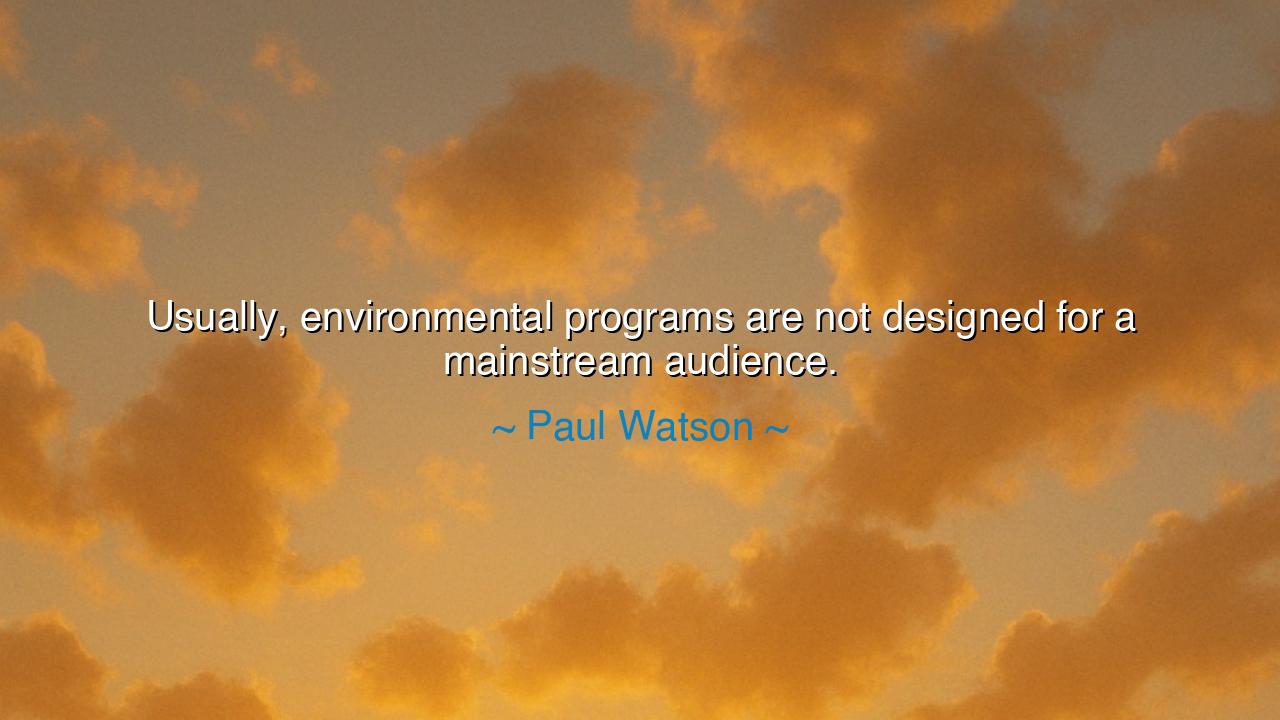
Usually, environmental programs are not designed for a mainstream






Hear the words of Paul Watson, seafarer and defender of the earth’s creatures, who proclaimed with candor: “Usually, environmental programs are not designed for a mainstream audience.” In this statement lies both a lament and a revelation. For he reminds us that while the world stands upon the edge of ecological ruin, the voices calling for change often speak only to the few, while the many pass by unmoved, distracted by the noise of daily life.
For what is an environmental program, if not a call to action, a rallying cry to preserve the forests, the oceans, and the air we breathe? Yet too often, such programs are crafted with language, ideas, and strategies that speak to the already-convinced, to the small circle of activists and believers. The mainstream audience—the vast majority whose choices shape the destiny of the planet—is left untouched, or worse, alienated. Thus Watson’s words reveal the tragedy: the struggle for the earth will never be won by a few, but only when the many awaken.
History shows us the peril of speaking only to the faithful. Recall the prophets of ancient times, who cried out against injustice and idolatry. Some spoke only within the temple walls, and their voices vanished like smoke. But others, like Amos or Jeremiah, went to the gates of the city and into the marketplaces, addressing the people where they lived, demanding repentance and change. Only when the message entered the mainstream could it stir the heart of a nation. So too must the message of environmental salvation break beyond the boundaries of activist circles and reach the ears of all.
Consider the example of Rachel Carson, whose book Silent Spring in 1962 did not remain within the chambers of scientists and environmentalists. She wrote with passion, clarity, and courage, making the hidden dangers of pesticides understandable to ordinary readers. Her words reached mothers, farmers, teachers, and lawmakers. The mainstream audience was moved, and their cry forced governments to act, leading to bans on harmful chemicals and the birth of modern environmental protection. Here we see what Watson longs for: programs that awaken the many, not just the few.
Yet the opposite has also occurred. Many environmental efforts fail because they demand sacrifices without offering hope, or speak in tones too harsh, too technical, too distant from daily concerns. People turn away, believing that the cause belongs to others, not to them. When the audience is not considered, the program falters, and the earth suffers. Watson’s words, then, are a call for strategy as well as passion: if the oceans are to be saved, if the forests are to endure, the message must be crafted for the multitude.
The lesson is clear: the fate of the earth rests not in the hands of a chosen few, but in the choices of millions. Therefore, environmental programs must be designed for all, speaking with clarity, urgency, and vision. They must connect the survival of whales to the food on the table, the health of forests to the breath of children, the preservation of species to the dignity of humanity. Only then will the majority rise, and only then will the world shift from indifference to action.
So, O listener, take this charge into your own life. Do not confine your words and actions to those who already agree. Speak to your neighbors, your family, your colleagues. Share the message of stewardship in ways that touch daily life and awaken common concern. Support movements that reach across divisions, that make environmental protection not a niche, but a universal cause.
Let the words of Paul Watson echo through the ages: the defense of the earth cannot remain hidden in the margins—it must live in the mainstream. Only when the cause of the planet is spoken in the language of the people, only when all feel its urgency, will humanity rise together to protect the fragile home entrusted to our care.






AAdministratorAdministrator
Welcome, honored guests. Please leave a comment, we will respond soon